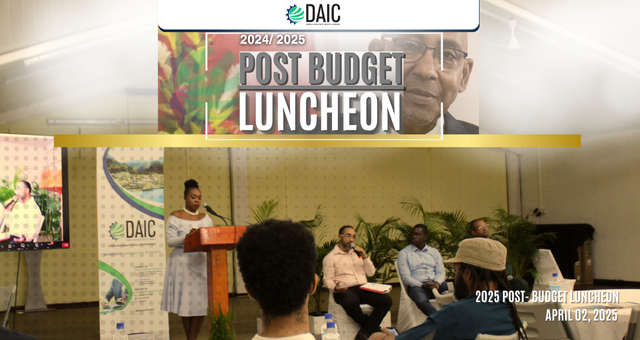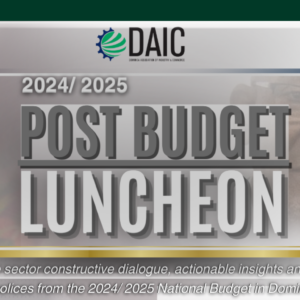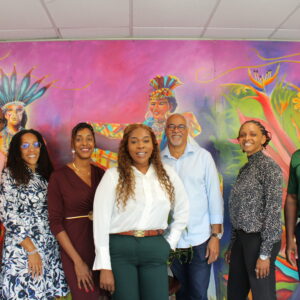‘Behind the Economic Genius of this public-private sector dialogue’
F E A T U R E A R T I C L E
Part I/II – By Ashfred Norris, DAIC Communications
April 02, 2025 was not only a day to remember by those who were there, but it is now a moment in time where the Dominica Association of Industry & Commerce (DAIC) successfully made landfall with the inaugural hosting of the Post-Budget Luncheon at the St. Alphonsus Parish Hall, Goodwill, Dominica.
The DAIC was joined alongside a host of organizations hailing from both the public and private sectors with the goal of engaging in meaningful dialogue regarding Dominica’s 2024/2025 National Budget address – delivered on Friday, July 26, 2024 by the Honourable Dr. Irving McIntyre, Minister of Finance, Economic Development, Climate Resilience, and Social Security.
As noted by the President of the DAIC, Brenton Hiliare in his opening remarks, “This gathering marks a timely and significant milestone not just for the DAIC, but for our nations’ evolving economic journey.”
Advocacy, insights and empowerment were the mainstays of the discussion, to which many attendees lauded the efforts of the Chamber for maintaining. For certain, the valued members of the DAIC were pleased with the unfolding of the events at the Luncheon and the conversations which ensued both on and off screen.
Hiliare, who applauded business owners and public entities for observing the need for such a dialogue and making every effort to be present, snowballed the importance and relevance that the event brings to Dominica’s economy.
“We came together today, not simply to review a financial document but to engage in meaningful dialogue about the direction in which we are headed as a country”, he stated. “The national budget represents far more than allocations and expenditures. It reflects our shared priorities, our aspirations as a people and our collective commitment to growth, resilience and prosperity. At the DAIC, we see this luncheon as more than a moment; it is a movement towards deeper collaboration”, Hiliare remarked.
The President briefly made mention of some of the key discussion points which attendees were eagerly prepared to discuss. “Today”, he started, “we will explore key components of the budget including; evolving policies on public health, business facilitation, infrastructure development and economic diversification. These are critical conversations and I invite us to approach them — not with fixed positions but, with open minds, respectful tones and a shared spirit of progress.”
He also included that, “I want to sincerely commend the DAIC Secretariat led by our Executive Director, Ashma McDougall, for their tireless efforts in convening this forum”. “The first of its kind! As well as, our partners across the government and the business community who have made this gathering possible.”
Executive Director of the DAIC, Ashma McDougall, moderated and chaired the discussion and led the first presentation for the morning, delivering a brief overview of the 2024/2025 National Budget from a Micro-Private Sector lens perspective.
In opening the ED stated, “The budget accounts for many provisions across sectors; agriculture, infrastructure, waste management, digitization, tax administration – and while many of these are interconnected, our approach today from the DAIC’s perspective is to narrow on specific budgetary items or provisions which would have impacted the private sector”.
Despite criticism from some who argue that a review so long after the 2024/25 budget announcement is unnecessary, McDougall emphasized the review’s significance and timeliness. “As we approach pre-budget consultations for 2025, I’ve had to stress the importance of monitoring and evaluation to various stakeholders. We recognize that conducting a review at least 6 months after the budget’s implementation can offer valuable insights and benefits for those directly impacted,” McDougall added.
This highlights the crucial role of reviewing a national budget six months post-implementation to assess its real-world effects and ensure its alignment with current needs.
The overview included five (5) key insights in the order of,
- 1) Navigating through unprecedented Economic and Social challenges with Strategic Resilience,
- 2) Fiscal Proposals Supporting Health, Education, and Climate Resilience Initiatives,
- 3) Fostering Local Entrepreneurship & Strengthening the Business Enterprise Ecosystem,
- 4) Proposed budget allocations prioritizing health sector enhancements for better citizen welfare
- 5) Climate resilience programs aimed at safeguarding vulnerable communities and ecosystems.
Additionally, the Growth & Development strategy, which highlighted the various capital projects which are ongoing by the Government of Dominica, also honed in on issues with water charges directly referring to the government’s recently enacted Water Access Charge, in which many businesses have called for a more equitable approach to charges. The Chamber sought after feedback from its members and drafted a Revised Water Rate Proposal to be submitted to the authority on water by the first week of April, 2025.
Minister of State within the Ministry of Labour, Public Service Reform, Social Partnership, Entrepreneurship and Small Business Development, the Honourable Daren Pinard, made contributions urging businesses to think outside the box on how they can take advantage of the opportunities that are arising as a result of the government’s ongoing capital projects.
After making mention of the various projects which includes; the current construction of the International Airport, the Cabrits Marina, the Dominica Cable Car project & the Dominica Geothermal Plant constructed in Laudat, new schools – including the Technical Centre of Excellence, which is being constructed, along with a few more ongoing capital projects.
“We’re creating the avenues and opportunities” he remarked, “but then we as the locals, the business people, we have to see how we’re going to position ourselves to take advantage of the opportunities created.” Prior to this, the Minister of State touched on the work of the Small Business Unit and their outreach to businesses in Dominica.
“What the small business unit is doing – separate from the entire government, we’re looking at creating an environment in general for small businesses and all businesses to grow and thrive but we’re also looking to see how we can provide individual support to businesses to help them establish, succeed, grow and to help them thrive.”
– END –




